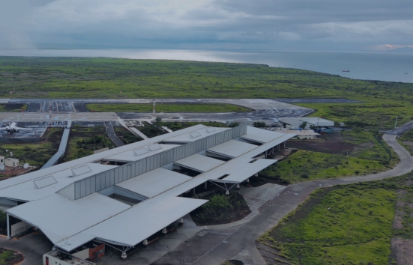Aeropuerto Ecológico de Galápagos’: A Model for Eco-Friendly Infrastructure
Start Reading

1. Company at a Glance
In this case study, we will explore how Aeropuerto Ecológico de Galápagos (ECOGAL) implemented the Recyclable Asphalt Pavement (RAP) Project to integrate circular economy principles into airport infrastructure, reducing environmental impact while maintaining operational excellence in the fragile Galápagos ecosystem.
This initiative intends to set an example for responsible infrastructure development in protected areas. It demonstrates that sustainable alternatives can uphold high operational standards while contributing to the preservation of ecosystems.
Airports and Aviation
Industry
2012
Founded
Ecuador
Headquarters
11
Number of Employees
2. The Challenge
Addressing the Climate Impact of Aviation.
The Galápagos Islands’ unique biodiversity and logistical challenges prompted ECOGAL to rethink virgin asphalt use in airport maintenance. Relying on imported cold mix asphalt from mainland Ecuador caused delays of up to 90 days, increased costs, and generated significant CO2 emissions. ECOGAL saw an opportunity to repurpose stored milled asphalt, reducing waste and aligning infrastructure development with the region’s conservation priorities.
3. The Action
Paving the Way with Recycled Asphalt
Diagnosing the Problem and Identifying Opportunities
ECOGAL began the Recyclable Asphalt Pavement (RAP) Project by closely examining the operational and environmental inefficiencies associated with importing cold mix asphalt from mainland Ecuador. Annually, approximately 22 tons of cold mix asphalt are used at the airport, with most patches requiring replacement within six months due to rapid aging and cracking, which leads to rainwater infiltration and accelerated deterioration of the pavement subbase. In addition to the operational burden, transporting this material over 1,000 kilometers by general cargo vessel generated an estimated 900 kg of CO2 emissions annually. This diagnostic phase revealed a clear opportunity to apply circular economy principles by reusing milled asphalt stored from previous resurfacing works, turning waste into a valuable resource. The reclaimed material is stockpiled approximately 300 meters from the runway centerline, in an area designated to avoid environmental risk.
Forging Partnerships to Enable Innovation
Recognizing the need for technical expertise, ECOGAL partnered with Geolab, a specialist in materials testing and asphalt formulation. Together, they conducted a series of feasibility studies to test different recycled mixtures and assess their suitability for airport use. The tests confirmed that the recycled asphalt was structurally suitable for patch repairs. The most effective mixture showed good compaction and tensile strength (0.88 Kg/cm²), with the milled material containing 5.78% asphalt and a bulk density of 1.377 Ton/m³. Based on these results, Geolab recommended adding 517.5 kg of CRS-H2 emulsion per 8 m³ of milled material, plus water to ensure uniform mixing. This partnership brought innovation into the heart of airport operations, allowing ECOGAL to pilot new solutions without compromising safety or quality. The collaboration enabled the organization to take a bold step toward asphalt recycling and resource efficiency while maintaining compliance with strict aviation safety standards.
The first real-world application of recycled asphalt took place on the airport’s commercial apron in 2022. This trial served as a critical proof of concept, validating the durability and resilience of the recycled material under operational pressures. Following its success, ECOGAL expanded the project to the runway itself, starting with a small intervention of 10.44 m². These initial steps demonstrated that recycled asphalt could meet performance standards while eliminating the need to transport 22 tons of virgin material annually.
Launching Pilot Projects to Test Performance in Real Conditions
The RAP Project was overseen by ECOGAL’s Maintenance Management team and validated by the Head of Sustainability, ensuring full alignment with the company’s broader sustainability strategy. By empowering technical teams to innovate and supporting them through cross-functional coordination, ECOGAL was able to integrate sustainability deeply into its infrastructure management approach.
Scaling the Initiative Through Continuous Monitoring
Encouraged by early results, ECOGAL broadened the scope of the project to cover a total of 431 m². This expansion was not only operationally beneficial but also environmentally impactful, reducing both material imports and emissions. Throughout the scaling process, the organization maintained a system of continuous monitoring to track durability, surface integrity, and safety performance. This data-driven approach ensured that every new layer of recycled asphalt met the rigorous demands of airport infrastructure.
Integrating Sustainability Through Internal Leadership and Oversight
The RAP Project was overseen by ECOGAL’s Maintenance Management team and validated by the Head of Sustainability, ensuring full alignment with the company’s broader sustainability strategy. By empowering technical teams to innovate and supporting them through cross-functional coordination, ECOGAL was able to integrate sustainability deeply into its infrastructure management approach.
4. Overcoming Barriers
Financial Concerns
Initial investment worries were mitigated by demonstrating substantial savings by reducing expenses related to purchasing, transporting, and storing cold mix asphalt.
Cultural Resistance
Introducing innovative practices can often meet resistance. Initially, there was skepticism among staff and contractors regarding the durability and quality of the recycled material compared to conventional mixes. This was addressed through training sessions and performance demonstrations, which helped build confidence and foster acceptance across operational teams.
5. Impacts & Results
Cost Savings
Annual savings of $12,000 were achieved by eliminating the need to import 22 tons of cold asphalt.
Operational Efficiency
Less downtime for runway repairs improved airport availability.
Environmental Impact
Reduced CO2 emissions by 900 kg annually through avoided transport and production. This is roughly equivalent to the emissions generated by a single passenger on a medium-haul flight of about 2,000–2,500 km. By minimizing waste and lowering CO2 emissions, the project aligns with the principles of the circular economy, promoting responsible consumption and production.
Employee Pride
The project has been recognized as a sustainable innovation, demonstrating how circular economy principles can be integrated into aviation infrastructure. This has fostered a sense of pride among employees.
Infrastructure Coverage
Expanded from 10.44 m² to 431 m² in only two years.
Reputation
The use of recycled materials represents a significant technical innovation in airport maintenance, demonstrating that sustainable practices can be effectively integrated into high-demand environments.
6. Key Lessons Learned
Thinking creatively about resource management and the long-term benefits of circular economy principles helps achieve both environmental and financial sustainability.
Partner early: collaborating with experts accelerates innovation and validation.
Highlighting savings and sustainability fosters stakeholder buy-in.
Set clear metrics to measure outcomes, monitor savings, and evaluate environmental
"Building on the success of the RAP project, we’re committed to expanding the use of recycled asphalt across the airport and exploring new circular solutions to drive even greater sustainability in our operations.”
- Jorge Rosillo, CEO de Ecogal
7. Resources
Inspired to take action?
Recommended UN Global Compact resources to support your journey:


